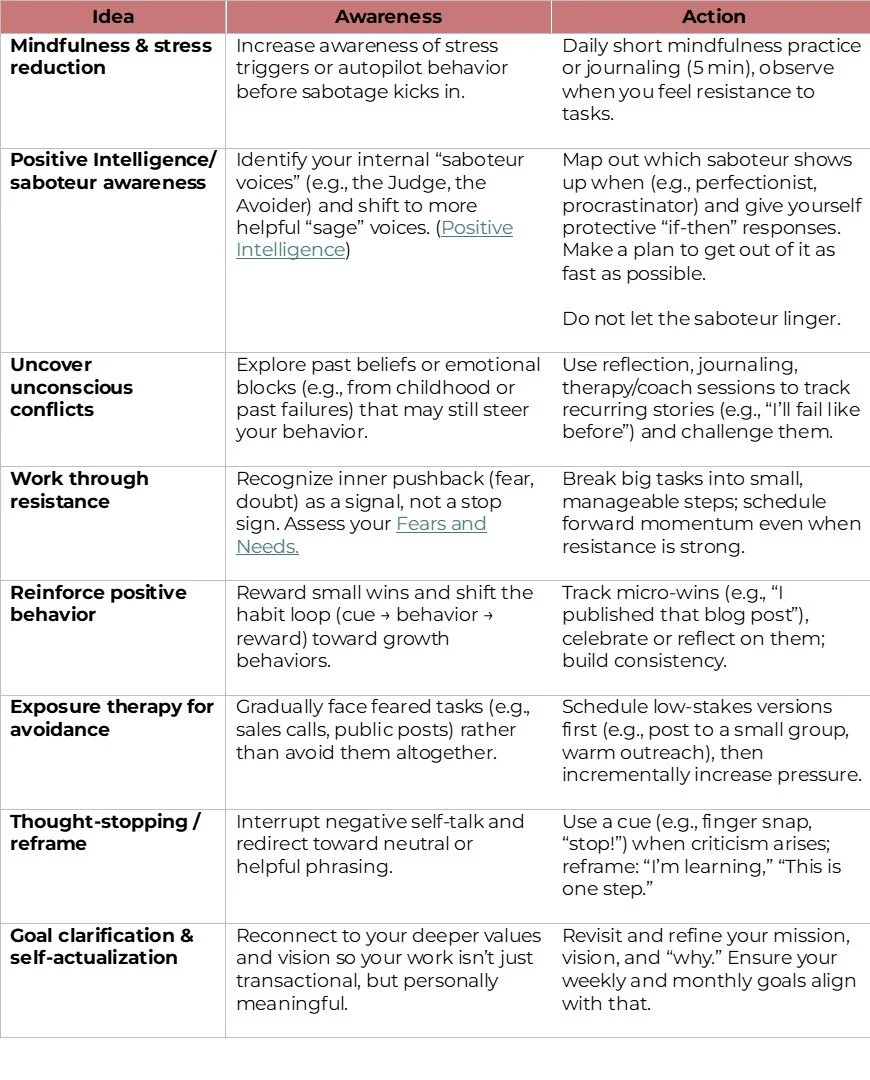Self-Sabotage. Don’t Do It.
There are days you wake up feeling like you can conquer the world. Then there are days you wake up saying, “Who am I to be building this business?” and then you do nothing for weeks! That’s self-sabotage. Of course, we all have days that are tougher than others to get work completed. Self-sabotage is deeper than the bump in the road. There are many reasons why we do it, but that requires deep self-reflection. For this conversation, it is identifying and calling out our saboteurs and building a plan to address them - as best as we can.
Here’s a version of the article “5 Self-Sabotaging Worksheets For Your Clients” (PositivePsychology.com) reframed as a useful guide for solopreneurs, along with key takeaways and action steps. Visit their site for the downloadable PDFs: PositivePsychology.com
What is self-sabotage (and why it matters for solopreneurs)
Definition: Self-sabotage happens when our own thoughts, feelings, or behaviors (often unconscious) create obstacles that block our long-term goals or well-being. (PositivePsychology.com)
Underlying such sabotage are subconscious fears or beliefs, such as fear of failure, fear of success, low self-worth, or negative core beliefs. (PositivePsychology.com)
For a solopreneur, self-sabotage may show up as delaying launching a product, discounting your offer when you should charge more, overcommitting and burning out, or avoiding outreach because of fear of rejection.
Common triggers & signs of self-sabotage (especially relevant to a solopreneur)
The article lists 7 causes and 7 types of self-sabotaging behavior. I’ve adapted them for solopreneurs.
Key psychological causes from PositivePsychology.com
Fear of failure — the possibility of “getting it wrong,” being judged, or losing investment, may lead you to stall.
Low self-esteem/self-worth — believing “I don’t deserve success,” or “I’m not good enough.”
Negative core beliefs — e.g., “I’m a fraud” or “If I succeed, I’ll lose something else.”
Fear of success/happiness — paradoxically, some avoid real success because it brings higher expectations, visibility, or pressure.
Impulsivity/poor emotional regulation — reacting emotionally rather than strategically can derail plans.
Perfectionism — setting unrealistically high standards or refusing to launch until “perfect,” thus never launching.
Fear of judgment — avoiding actions where failure or criticism is possible (e.g., marketing, sales outreach)
These psychological causes show up in different ways. These are identified as behavioral expressions (types) as outlined in PositivePsychology.com
Procrastination: Delaying key tasks such as client outreach, content creation, or product development.
Self-criticism/harsh inner critic: Undermining confidence, second-guessing, dismissing wins.
People pleasing/overcommitment: Taking on too many client demands (or too many freebies) to avoid conflict or rejection.
Learned helplessness/giving up: When setbacks accumulate, you stop trying new strategies.
Risky behaviors/escape: E.g., switching ideas too frequently, jumping into new ventures impulsively.
Relationship sabotage: In a small-business sense, starving your network, procrastinating communication, and burning bridges through inconsistency.
Avoiding self-care: Neglecting rest, mental health, and boundaries, which then feeds burnout and poor decision-making.
Self-sabotage is especially risky for solopreneurs
When you’re working solo, there’s no team to catch you—or your slack. If you stop, everything stops.
Juggling every role, wearing a hundred hats (check out Ginger’s video), means faster fatigue and more self-doubt. Fear of failure or judgment can freeze progress, and every stuck moment costs opportunity—and income.
When business slows, it can feel like you’ve failed. Because for solopreneurs, the work isn’t just business—it’s personal.
Based on the article, here are 8 strategies to break self-sabotage (adapted for solopreneurs), leveraging content from PositivePsychology.com. They have been modified for the solopreneur:
Table of 8 strategies.
How to put this into practice as a solopreneur
Start small: Pick one sabotaging pattern you've noticed (e.g., procrastination around sales) and one strategy (e.g., exposure / thought-stopping) to practice for 2 weeks.
Track your triggers: Maintain a mini journal of when resistance or negative self-talk arises (what you were about to do, your inner voice, what you chose instead). Assess your Fears and Needs.
Celebrate micro-wins: Even sending one outreach message or posting one piece of content is progress. Use reinforcement to rewire your behavior.
Review & refine: At month-end, reflect: what sabotaged me this month? What helped? Adjust your plan.
Use self-compassion: When you notice sabotage, respond kindly—acknowledge fear or doubt, rather than attacking yourself.
Consider a coach or peer jumpstart: Sometimes external accountability (or uncovering blind spots) helps break the cycle of sabotage. BoldLEAP Sessions
As a solopreneur, you can use these tools personally (daily or weekly) or even adapt them as content or worksheets for your clients (if you coach or consult). The article in PositivePsychology.com has workbooks to support your journey.
About Charissa
Charissa Gant, Change Strategist with over 30 years of experience driving change for Fortune 500 companies. Most recently, a Principal Director at one of the largest consulting firms. Leading change with empathy. Unlocking leadership potential. Owner and Founder of BoldLEAP Collective, a community for courageous solopreneurs. Charissa@boldleapcollective.com


